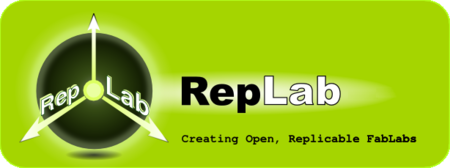RepLab: Difference between revisions
No edit summary |
No edit summary |
||
| (16 intermediate revisions by 3 users not shown) | |||
| Line 1: | Line 1: | ||
{{OrigLang}} | |||
{{Breadcrumb|Digital Fabrication}} | {{Breadcrumb|Digital Fabrication}} | ||
[[Image:replab.png|center|450px]] | [[Image:replab.png|center|450px]] | ||
'''RepLab''' is a proposed [[Digital Fabrication|digital fabrication]] workshop. Unlike the [[MIT FabLab]], RepLab is based on open source tools and is thus 1/10th the cost. The first prototype of this is the [[FeF Workshop]], in existnce since 2012. Newer work on this is the smaller, desktop tools - 3D Printers, filament maker, laser cutter, and CNC circuit mill. See 2018 work at https://microfactory.opensourceecology.org/workshops/. The more recent work at OSE revolves around the [[Open Source Microfactory]]. RepLab, Open Source Microfactory, open source fablab - are all synonymous. | |||
It would be a room with computer-controlled tools that could mold metal into any shape, mold plastic into any shape, print circuit boards, scan 3D shapes, melt down metal and roll metal to any stock steel section. The result is that you could make any electronic or mechanical device. Inputs are scrap metal, plastic and silicon - out come bicycles, saucepans, [[LifeTrac|tractors]], medical equipment, mobile phones, laptop computers, Internet nodes, [[Solar Turbine|solar turbines]], sculptures, robots and whatever else you can imagine. And one of the things it would be able to make would be another RepLab, as all the fabrication machines would use open-source designs. This would allow the labs to multiply like rabbits. | |||
This promise has been around since the Star Trek replicator, but to date, only a partial or non-open source implementations are available - such as [[OpenDesk]]. [[WikiHouse]] appears to be fully open. And the [[MIT FabLab]] (tools not open source and designs non-commercial). OSE aims to bridge this gap no later than by 2028. | |||
= | =2023 Update= | ||
Desktop semiconductor foundry actually exists, and costs about $10-20M to implement - see [[Semiconductor Fabrication]]. | |||
=Design= | |||
*[[RepLab Design]] | |||
=Tools= | |||
*[[RepLab Tools]] | *[[RepLab Tools]] | ||
=People= | |||
*[[Heath Matlock]] | *[[Heath Matlock]] | ||
*[[Leo.dearden]] | *[[Leo.dearden]] | ||
| Line 26: | Line 25: | ||
*[[Sebastien]] | *[[Sebastien]] | ||
=Research= | |||
*[http://future.wikia.com/wiki/Desktop_Semiconductor_Foundry Desktop Semiconductor Foundry] | |||
*[http://www.physikinstrumente.com/en/products/piezo_tutorial.php Nanopositioning] | |||
== | =Links= | ||
*[[OSE Workshop]] and [[Workshop]] layout. | |||
*[[Open Source Microfactory]] | |||
*[[Basic Workshop]] | |||
*[[Digital Fabrication]] | *[[Digital Fabrication]] | ||
*[[MIT Fab Lab item list]] | |||
Latest revision as of 17:47, 23 November 2025
RepLab is a proposed digital fabrication workshop. Unlike the MIT FabLab, RepLab is based on open source tools and is thus 1/10th the cost. The first prototype of this is the FeF Workshop, in existnce since 2012. Newer work on this is the smaller, desktop tools - 3D Printers, filament maker, laser cutter, and CNC circuit mill. See 2018 work at https://microfactory.opensourceecology.org/workshops/. The more recent work at OSE revolves around the Open Source Microfactory. RepLab, Open Source Microfactory, open source fablab - are all synonymous.
It would be a room with computer-controlled tools that could mold metal into any shape, mold plastic into any shape, print circuit boards, scan 3D shapes, melt down metal and roll metal to any stock steel section. The result is that you could make any electronic or mechanical device. Inputs are scrap metal, plastic and silicon - out come bicycles, saucepans, tractors, medical equipment, mobile phones, laptop computers, Internet nodes, solar turbines, sculptures, robots and whatever else you can imagine. And one of the things it would be able to make would be another RepLab, as all the fabrication machines would use open-source designs. This would allow the labs to multiply like rabbits.
This promise has been around since the Star Trek replicator, but to date, only a partial or non-open source implementations are available - such as OpenDesk. WikiHouse appears to be fully open. And the MIT FabLab (tools not open source and designs non-commercial). OSE aims to bridge this gap no later than by 2028.
2023 Update
Desktop semiconductor foundry actually exists, and costs about $10-20M to implement - see Semiconductor Fabrication.
